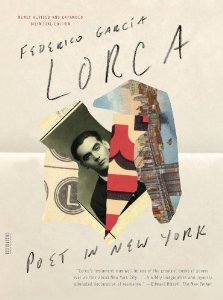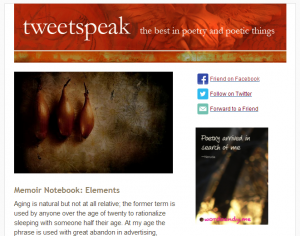A new edition of Federico García Lorca’s Poet in New York is deepening my understanding and appreciation of the Spanish dramatist and poet.
I’m familiar with the basic outline of his biography &mdash born in 1898, gained a name as a young poet of some notoriety, died at the hands of General Franco’s forces in 1936. More than 20 years ago, I read an edition of his Collected Poems but was not familiar with the poems written while he was in New York, from 1929 to 1930.
His time in New York was connected to his attending Columbia University, which was apparently all of one semester. After that, he spent time with an American friend in Vermont and then went to Cuba. His family had sent him to New York to distance him from rumors of scandal circulating around him in Spain — connected to a failed love affair with a sculptor. García Lorca realized he had been used to further the sculptor’s career, and he seemingly went willingly to New York.
He had or made friends in New York, people familiar with Spanish arts and letters and the poet’s modernism. He studied English at Columbia. In the introduction to this edition of Poet in New York, editor Christopher Maurer says that his letters home suggest this was a good experience for him, that he was enjoying the largest city he had ever experienced. The poems themselves, however, suggest something else — shock and dislocation, and a decided alienation from almost all that New York represented.
After spending a few weeks in Vermont, García Lorca returned to New York and wrote this in the poem entitled “New York”:
Under the multiplications,
a drop of duck’s blood;
under the divisions,
a drop of sailor’s blood;
under the additions, a drop of tender blood.
A river that sings and flows
past bedrooms in the boroughs—
and it’s money, cement, or wind
in New York’s counterfeit dawn.
I know the mountains exist.
And wisdom’s eyeglasses,
too. But I didn’t come to see the sky.
I’m here to see the clouded blood…
He organized the poems into 10 chapters, but they weren’t published until after his death. He did incorporate them into public readings in Spain, Argentina, and Uruguay, Maurer says.

Almost 80 years after his death, his poems are still read and studied, with new editions and biographies continuing to be produced. Through his poems, he speaks to and for the marginalized and the disaffected. He shares much with Walt Whitman, and for many of the same reasons. And it’s not surprising that his “Ode to Walt Whitman” in this collection is more of an insult to those who would see Whitman as a sexual icon instead of seeing him for what he created.
As with Whitman, García Lorca is remembered primarily for what he created — haunting, beautiful, and often disturbing poetry. I suspect he would be pleased.
The poems in Poet in New York are translated from the Spanish by Greg Simon and Steven White. This edition was published in April.
Image by Kevin Dooley. Sourced via Flickr. Post by Glynn Young, author of the novels Dancing Priest and the recently published A Light Shining.
Browse more book reviews and poets.
___________________________
Subscribe to our free weekly newsletter.
We’ll make your Saturdays happy with a regular delivery of the best in poetry and poetic things.
Need a little convincing? Enjoy a free sample.
- Longfellow’s “Paul Revere’s Ride”: Creating a National Legend - April 17, 2025
- Poets and Poems: Katie Kalisz and “Flu Season” - April 15, 2025
- Poets and Poems: Michelle Ortega and “When You Ask Me, Why Paris?” - April 10, 2025

Martha Orlando says
Glynn, this article definitely makes me want to read more of Garcia Lorca’s work. Thank you!
Juliana Kapetanov says
Great review, Glynn! It’s good to see a Spanish poet’s work featured here (even if it’s in translation). I’m familiar with García Lorca’s play La Casa de Bernarda Alba, but I’ve never read his poetry. I’m looking forward to reading some of his poems soon. Thanks!